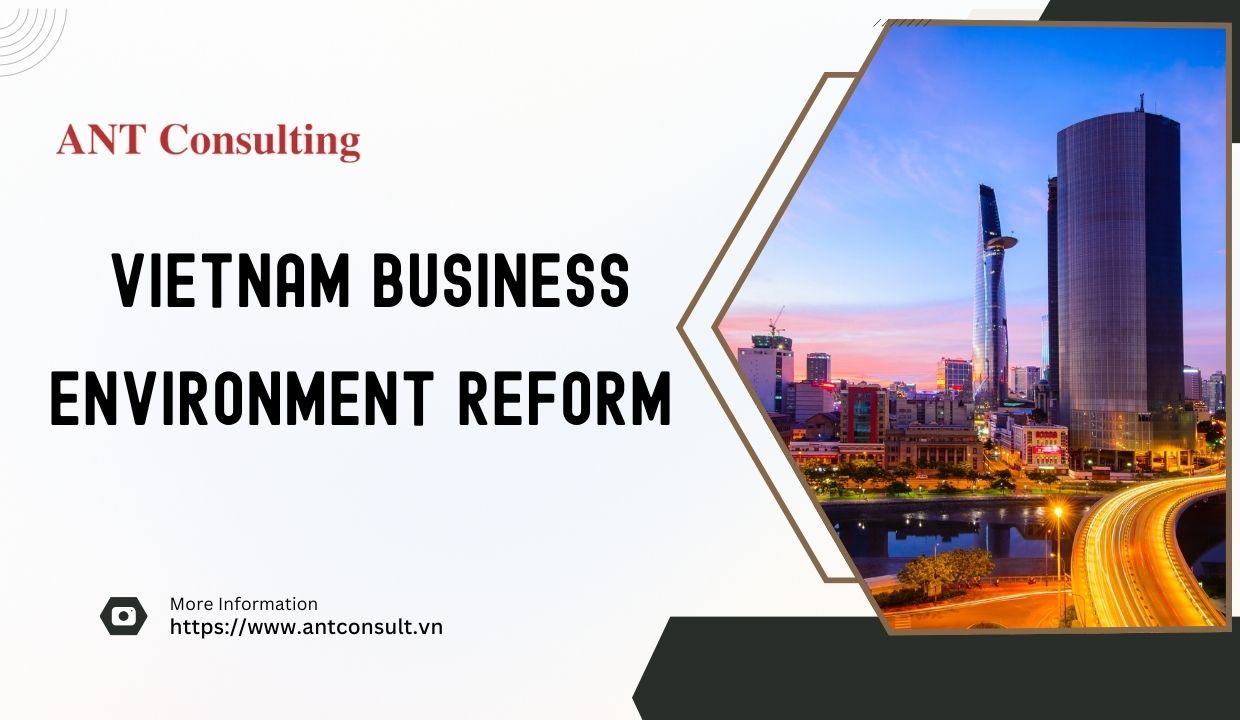You could imagine, for us, Vietnamese, growing up in Vietnam during 70 and 80s, it was a difficult time.
It was the time Vietnam followed the central planning economy model.
Look, it is changing fast. Investors should pay attention!
Opportunities are no longer whispers, they’re written in national policy just now, which trigger Vietnam business environment reform.

From Quiet Progress to Loud Promise
Vietnam is making noise. But not the kind from traffic or street markets. This is policy noise. It’s coming from Hanoi, and it’s loud and clear.
A new government resolution is reshaping the country’s approach to business. It’s called Resolution 68. And it signals something powerful: the Vietnam business environment reform is no longer theory, it’s strategy.
For decades, Vietnam grew steadily with a mix of public and private enterprise. But private companies often played second role. Now, that’s changing. This reform pushes the private sector to the front of Vietnam’s economic engine.
So what does this mean for you, if you’re an investor, business owner, or entrepreneur?
It means the landscape is shifting in your favor. But only if you understand the past, the present changes, and what doors are opening next.
Let’s break it down.
Vietnam’s Economic History: From Central Planning to Open Markets
To understand Vietnam today, we must look back.
For much of the 20th century, Vietnam operated under a centrally planned economy, influenced heavily by the Soviet model. Decisions on production, pricing, and investment came from the top. The state managed most industries. The private sector, if it existed at all, was tiny and tightly controlled.
After reunification in 1975, this model intensified. Vietnam faced trade embargoes, limited foreign ties, and economic hardship. But change began in 1986.
That year, Vietnam launched “Đoi Moi”, a major reform program. It opened the door to marke oriented policies, encouraged private enterprise, and welcomed foreign investment.
Since then, the country has grown impressively. Poverty fell. Trade soared. Manufacturing boomed. But while private businesses expanded, state-owned enterprises (SOEs) still dominated key sectors like energy, banking, telecoms, and transportation.
SOEs carried the economy through industrialization, but they also brought challenges.
The Rise and Struggles of Vietnam’s State-Owned Enterprises
State-owned companies once held the steering wheel of Vietnam’s economy. They had access to capital, government support, and vast resources. Many built the roads, power grids, and ports the country needed. But over time, it has been proven Vietnam could have done better.
Private companies, meanwhile, were growing fast. But they often faced more scrutiny, limited credit access, and administrative hurdle. The playing field was not level.
Vietnam needed more than infrastructure. It needed innovation, flexibility, and competition. That’s where the private sector comes in, and where Vietnam business environment reform becomes key.
Resolution 68: Private Sector at the Center of Vietnam’s Growth Model
On May 4, 2025, the Politburo of Vietnam issued Resolution No. 68. Its message was clear and historic:
“The private sector is the most important driving force of the national economy.”
This wasn’t just a phrase. It was a turning point in how Vietnam sees its future.
Resolution 68 outlines major policy goals:
- Protecting private property and investor rights
- Encouraging competition between public and private firms
- Simplifying procedures for starting and operating businesses
- Promoting innovation, digital transformation, and green growth
- Integrating Vietnam’s private sector into global supply chains
More importantly, it marks a cultural shift in policymaking. In the past, private enterprise was viewed cautiously. Now, it’s a partner for national development.
That’s a big deal, for Vietnam and for anyone who wants to do business here.
Big Targets that Matter to Foreign Investors
Resolution 68 doesn’t stop at vision. It includes numbers. Big numbers. And they send strong signals to global investors.
By 2030, Vietnam aims to:
- Have 2 million registered private businesses
- Develop at least 20 companies with global competitiveness
- Make the private sector contribute 55–58% of GDP
- Ensure private firms generate 35–40% of state budget revenues
- Provide jobs for over 85% of the labor force
- Achieve labor productivity growth of 8.5–9.5% annually
By 2045, the goals grow larger:
- At least 3 million private businesses
- Over 60% of GDP from private sector
- Global recognition of Vietnamese firms in key industries
These targets aren’t just internal milestones. They are invitations. If you run a foreign business looking to enter Vietnam and start a business in Viennam, it is offering a long-term roadmap, and a welcome mat.
What Vietnam’s Business Environment Reform Really Changes
At the heart of these targets is Vietnam business environment reform, a comprehensive push to improve how businesses are treated and supported in the country.
Here’s what’s changing:
Legal Framework Modernization
- Streamlining laws to remove contradictions
- Strengthening contract enforcement and dispute resolution
- Providing better protection of intellectual property
- Offering clearer guidelines for foreign ownership
Administrative Simplification
- Reducing the time and cost to register a company
- Simplifying tax and customs procedures
- Digitizing government services for licensing and reporting
Fair Competition
- Cutting privileges enjoyed by SOEs
- Applying the same rules to all businesses, regardless of ownership
- Fighting unfair practices like local favoritism or monopolies
Market Access and Finance
- Improving access to bank loans and venture capital for private firms
- Encouraging IPOs and public-private partnerships
- Opening sectors like logistics, renewable energy, and digital services to more competition
These steps are not abstract. They are being written into action plans, laws, and future decrees. For investors, this means more certainty and fewer surprises.
Where the Best Opportunities Are Emerging
Reform creates movement. And movement creates openings. Here are sectors where foreign investors can benefit from Vietnam’s new business climate:
High-Tech Manufacturing
Vietnam is already a top choice for electronics assembly. But now, local tech firms are getting policy support. The government wants foreign partners to help develop R&D, semiconductors, automation, and AI.
Green Energy and Infrastructure
Vietnam’s energy needs are huge, and so are its climate commitments. Solar, wind, and LNG projects are expanding, and private investment is welcome.
Digital Economy
E-commerce, fintech, digital payments, and logistics are booming. With more legal clarity coming, these sectors offer high growth and quick scalability.
Healthcare and Education
As Vietnam’s middle class grows, demand for private hospitals, clinics, and international schools is surging. Foreign expertise and capital are key to meeting this demand.
State-Owned Enterprise Divestment
Vietnam is continuing to reduce its SOE footprint. This opens chances to buy into formerly closed sectors like telecoms, construction, and banking.
In short: If you’re ready to co-invest, partner, or compete in Vietnam, now is the time.
Smart Moves Foreign Investors Should Make Now
Stay Informed on Policy Updates
Resolution 68 is just the beginning. Follow-up laws and ministerial decisions will shape its implementation. Stay connected to local news, legal advisors, and trade associations.
Build Local Relationships
Vietnamese business culture values trust and personal connections. Engage with local firms in Vietnam, attend conferences, and invest in relationship-building.
Use the Reform to Your Advantage
The reform helps you, but only if you leverage it. Apply for investment licenses. Participate in new incentive programs. Expand into provinces that now offer better terms for private firms.
Evaluate Risks with a Long-Term Lens
No reform is perfect. Vietnam still faces issues like uneven provincial enforcement, digital regulation gaps, and bureaucracy. But the direction is positive, and staying ahead means being ready before the crowd catches on.
The Vietnam Advantage is Now Reform-Powered
Vietnam is not standing still. With Resolution 68, it has declared that private enterprise is no longer optional, it’s essential.
This marks a full embrace of Vietnam business environment reform, not just as a slogan but as a strategic framework for growth.
Yes, Vietnam still offers low labor costs. Yes, it still has favorable trade access. But now, it’s also becoming a place where business can thrive by merit, not just proximity or politics.
The private sector is rising. The rules are changing. The welcome mat is out.
Will your business be part of Vietnam’s next chapter?
About ANT Consulting and Market Entry Services in Vietnam
ANT Consulting is here to assist you from the outset; providing intelligence, information, advisory, management or support services that assist market entrance, and ensure efficient business start-up operation.
Research Service
Company Profiling and Due Diligence
Policy and Regulatory Research
Assistance in Setting-up Business Venture
M&A Origination & Execution
For legal advise, consult with ANT Lawyers
How ANT Consulting Could Help Your Business?
You could learn more about ANT Consulting or contact our lawyers and consultants in Vietnam for advice via email ant@antconsult.vn or call our office at +84 28 730 86 529




